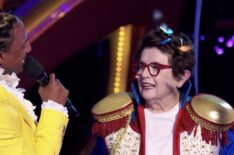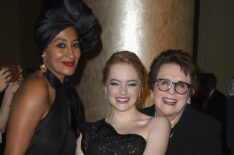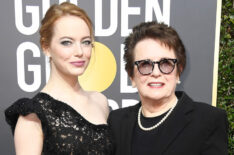A champion on the tennis court and for equal rights, Billie Jean King was a true pioneer in the world of sports. She fell in love with tennis as a young girl growing up in Southern California, and went on to dominate the sport in the 1960s and 1970s by winning several Grand Slam matches, including the prestigious Wimbledon tournament, as a singles and doubles player.
King won a record 20 Wimbledon titles, 13 U.S. Open titles, four at the French Open, and two at the Australian Open. She historically faced off against Bobby Riggs during the 1973 "Battle of the Sexes" match, which ended with King taking home the top prize and gaining respect for female athletes all over the world. She was also one of the first openly gay athletes and continually advocated against discrimination and fought for equality, years after she retired from competitive play.
In 2009, King was awarded the Presidential Medal of Freedom, an honor deservedly bestowed upon a tennis legend and one of the most influential people of the 20th Century.
Billie Jean Moffit was born on Nov. 22, 1943 in Long Beach, CA. The daughter of a fireman and housewife, she was raised in a conservative Methodist home. The future tennis star began playing at courts near her home. It was evident that athletics ran in the family blood, as King's younger brother, Randy Moffit, grew up to play major league baseball, pitching for teams such as the San Francisco Giants and Toronto Blue Jays.
King attended Long Beach Polytechnic High School while training for a professional career in tennis. She made her Grand Slam debut at the age of 15, competing in the U.S. Open. Unfortunately, she was eliminated during the first round. King continued her losing streak at various tournaments until 18 Grand Slam-titleholder Alice Marble began coaching her in 1959. The following year, King won her first adult tournament title at the Philadelphia and District Women's Grass Court Championships.
King gained international fame in 1962 after winning the women's doubles finals with Karen Hantze Susman at Wimbledon, considered the oldest and most prestigious of the Grand Slam tournaments. She returned to Wimbledon in 1963 as a singles player, but was beat out by Australian Margaret Court in the finals. Three years later, King won her first Grand Slam title at Wimbledon, beating Brazilian player Maria Bueno after three rounds. King defended her title in 1967 and took home the coveted trophy once again.
She went on to win the Wimbledon women's singles four more times in 1968, 1972, 1973 and 1975. King also nabbed Grand Slam wins between 1966 and 1975 - considered her prime competitive years - including the U.S. Open in 1967, 1971, 1972 and 1974, the French Open in 1972, and the Australian Open in 1968. In 1972, King became the first tennis player named by Sports Illustrated as Sportsman of the Year.
King added to her trophy case with multiple wins at the Grand Slam events as a doubles player. Yet it was her 1973 match against American male tennis player Bobby Riggs that landed King in the history books. Dubbed the "Battle of the Sexes," the Grand Slam-winning duo faced each other in a widely televised match held at the Houston Astrodome in Texas. Riggs claimed prior to their match that even at 55 years old, he could beat a current top female athlete.
King proved her opponent wrong by beating him in three rounds (6-4, 6-3, 6-3). She took home $100,000 for the highly publicized match and earned respect for women players that would resonate for decades. During the early 1970s, King headlined the first professional women's tour, the Virginia Slims and was named the first president of the Women's Tennis Association in 1974.
She retired from professional competition the following year after beating British player Evonne Goolagong Cawley at Wimbledon in what King described as a "near perfect match" (6-0, 6-1). Her retirement came shortly after she won alongside Australian Phil Dent in the mixed doubles finals at the 1976 U.S. Open. She slowed down from professional competition after enduring right knee surgery in the mid-1970s. After more unsuccessful attempts to reclaim her dominance from the last few years, King officially retired from competitive singles play in 1983.
King's personal life was as much discussed as her professional accomplishments. She married Lawrence King in September 1965. The couple did not have any children, although her husband revealed in an interview with Ms. magazine - without her consent - that King had undergone an abortion in 1971. King later confirmed that she terminated the pregnancy because she felt her marriage was not stable enough to raise a family.
That same year, the tennis champ began an affair with her secretary Marilyn Barnett. King was forced to publicly acknowledge her sexuality after Barnett filed a palimony lawsuit against her in 1981. It was the first time in history that a professional female athlete came out as a lesbian, opening the doors for tennis pros such as Martina Navratilova to also come out. King's marriage to Lawrence ended in divorce in 1985.
Despite her personal turmoil, the tennis world continually recognized King for her accomplishments on the court and her efforts to promote equality for female athletes. She was elected to the International Tennis Hall of Fame in 1987 and served as captain of the United States Fed Cup team in the 1990s. She received the Arthur Ashe Courage Award in 1999 and made LIFE magazine's list of the "100 Most Important Americans of the 20th Century."
In 2006, the women's sports foundation named the Billie Awards after her, which recognized the impact of women in sports and encouraged young women to participate in physical activities. That same year, the USTA National Tennis Center in Flushing Meadows-Corona Park, NY was rededicated as the USTA Billie Jean King National Tennis Center. She made a very rare acting appearance in 2007 with a guest-starring role on NBC's "Law and Order" (1990-2010).
King also received honors for her humanitarian work by organizations such as GLAAD and the Human Rights Campaign. In 2009, President Barack Obama awarded King with the Presidential Medal of Freedom, the highest civilian award in the United States.
By Candy Cuenco


























































